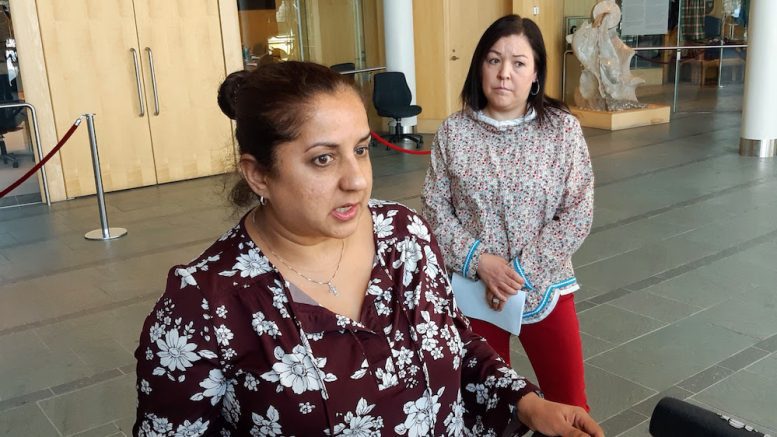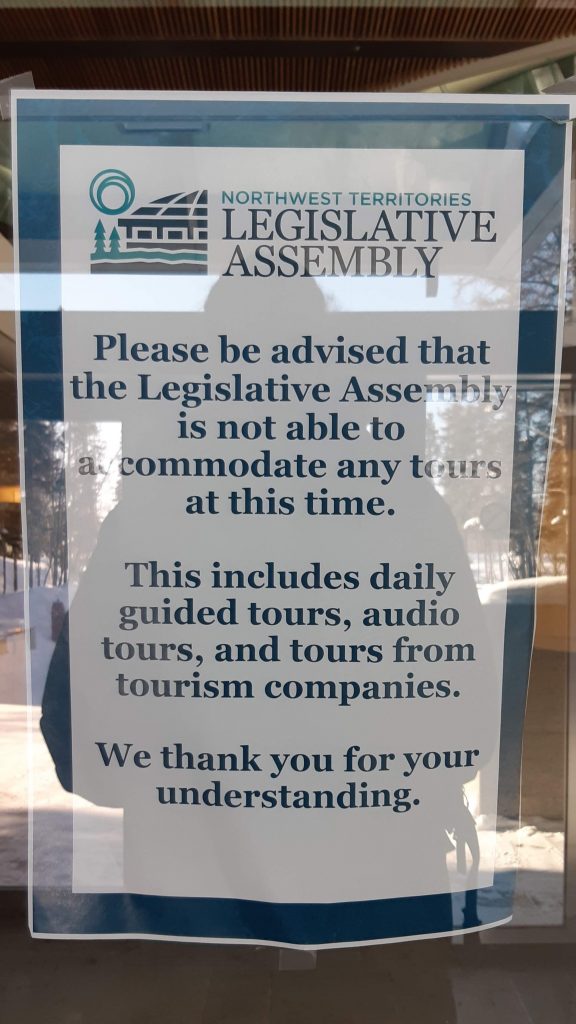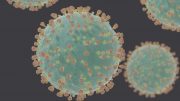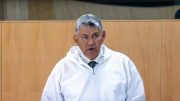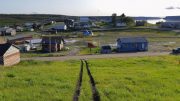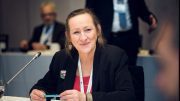It was a coronavirus-themed day at the Legislative Assembly on Friday.
Nearly all regular MLAs had a COVID-19 question for cabinet.
Earlier in the sitting, Speaker Frederick Blake Jr. announced the rest of the winter session would be suspended to deal with coronavirus concerns.
Still no confirmed cases
As of Friday afternoon, 80 tests have been administered in the territory with still no recorded cases of coronavirus; there are 153 confirmed cases in Canada with that number growing daily.
Tu Nedhé-Wiilideh MLA Steve Norn asked Health and Social Services Minister Diane Thom if her department had a backup plan in case more frontline staff were needed in community health centres.
Thom took the opportunity to offer a lengthy update on how the department was preparing for the virus, including regular updates for staff on new developments, training on proper hand hygiene, education sheets on COVID-19 and weekly updates across the Northwest Territories Health and Social Services Agency (NTHSSA).
She also said residents can stay up to date by visiting the health department’s coronavirus webpage.
The minister added that testing swabs were being delivered regularly to health centres across the territory.
Following Friday’s sitting Thom, Premier Caroline Cochrane and Chief Public Health Officer Dr. Kami Kandola held a press conference updating residents on the latest development of the virus in the territory.
CKLB asked Thom how her department was monitoring frontline staffing needs and how quickly it could respond to those needs.
Thom commended healthcare staff before saying, “We are spread thin. We are managing. This is a crisis kind of situation. We have no cases yet but we have plans in place. We’re looking department wide on how we can support each other.”
Premier Cochrane then interjected to say she has directed all departments with frontline staff—including income assistance, housing workers and victim services among others—to practise “tabletop exercises,” essentially emergency response simulations.
“Again, reinforcing that we don’t have any confirmed cases in the territories,” said the premier, “we are doing our due diligence to make sure that we are preparing our public services and our communities as best as possible to address this if and when it comes up.”
Response challenges
On March 11, the federal government announced it would allocate $1 billion to help provinces and territories prepare and combat coronavirus.
It also asked the premiers of all territories and provinces to come up with a list of possible gaps in their ability to respond to COVID-19.
On Friday, the premier said she had a phone call with the prime minister to discuss northern challenges.
“We have overcrowded houses, we lack healthcare provisions, we have infrastructure (needs),” she told reporters.
She added that it wasn’t a matter of if coronavirus will hit the NWT, but rather an issue of when.
“When it hits, we’re trying to emphasize to Ottawa that we will be in dire need,” said the premier. “Trudeau has committed that he’s looking to do special measures for the North, recognizing our needs are more dire. We are the most vulnerable people.”
Given these difficulties, CKLB asked if the government had an anticipated cost for fighting coronavirus.
Kim Riles, chief operating officer of the NTHSSA, said it was too early to have a cost estimate but “anticipates it will be significant.”
Riles added that the NTHSSA has set up a system to track costs related to coronavirus to more easily get that money back in funding from the federal government.
Self-isolation precautions
Dr. Kandola said self-isolation is mainly warranted when waiting for test results. For example, Minister Katrina Nokleby has been self-isolating since returning from the Prospectors and Developers Association of Canada conference in Toronto after an attendee was confirmed to have the virus.
What happens if someone does have coronavirus?
“Most people with COVID-19 are presenting with mild flu-like illness,” said Dr. Kandola. “So just like any other flu, they need to take care of themselves and prevent other family members from getting sick.”
And if people need a caretaker, she said her office has developed guidelines for them to protect themselves and minimize contact with the patient.
(CKLB has asked for a copy of these guidelines as they do not seem to be available on the government’s coronavirus webpage.)
If someone with the virus is living with a senior, Dr. Kandola recommended moving them to prevent further exposure and monitoring them for symptoms.
During Friday’s sitting, Housing Corporation Minister Paulie Chinna said her department would be in contact with hotels in case housing clients or homeless people would need to self-isolate.
Yellowknife North MLA also asked about evictions if coronavirus was to become a widespread problem in the territory.
“For now, we won’t be evicting anybody,” said Chinna.
Yellowknife Centre MLA Julie Green asked Minister Thom how her department is taking precautions for seniors in long-term care.
Seniors are the most at-risk to contract coronavirus. For now, Thom said her department was reaching out to long-term care homes and impart the importance of minimizing contact and proper hygiene.
Asked if there were any special precautions, Thom’s message was to limit access to seniors in long-term care.
Schools remain open among cancellation of public gatherings
Several events have been cancelled or delayed across the country in the past week.
Dr. Kandola urged event organizers to get in touch with her office to assess whether they should cancel or not.
Inspired by Ontario’s decision to close down schools for an additional two weeks after March break, Nunakput MLA Jackie Jacobson asked Education, Culture and Employment Minister R.J. Simpson during Friday’s sitting if he would do the same.
Simpson said the government is following advice from the chief public health officer and so far Dr. Kandola has not recommended closing schools.
However, “nothing is off the table,” he added.
Simpson said he doesn’t have the authority to shut down schools; that is up to the District Education Authorities (DEA) and Divisional Education Councils (DEC).
Inuvik-Twin Lakes MLA Lesa Semmler asked if the DEAs and DECs could have meetings with health experts so they can make the appropriate decision on whether to close schools.
Simpson said his department was working with superintendents across the territory to relay information and added he’d work to open more direct lines of communication with DEAs and DECs across the territory.
The office of the chief public health officer also recently sent a letter to schools and daycare operators on how to prepare and prevent coronavirus.
What will happen with the first confirmed case?
Dr. Kandola said her office would issue a press release and quickly publicize if there was to be a test that came back positive for coronavirus.
Asked if her office would identify the community, Dr. Kandola said it was important to protect the privacy of the patient and likely wouldn’t say if they came from a small community. However, she said her office would share the circumstances that may have led to the person contracting the virus, like if they were recently travelling or were at a large gathering.
“Our role is to identify a public health hazard and to mitigate spread,” she said.
According to Dr. Kandola, of the 153 confirmed cases in Canada, 80 per cent are travel-related, where people visited infected locations, and another 10 per cent are a friend or family member of those individuals.
If you believe you may have coronavirus, see who to contact below (courtesy of NTHSSA):
- Yellowknife: Call Public Health at (867) 767-9120. There are dedicated nursing staff who will complete an intake questionnaire and provide details about where to get tested. There will be a dedicated testing site for COVID-19 testing and all residents who may need testing to first speak with Pubic Health and not present to our facilities if they believe they need testing.
- Inuvik / Fort Smith / Hay River: Call Public Health to complete an intake questionnaire. Those who require testing will be visited for in-home testing.
- Inuvik: (867) 777-7246
- Fort Smith: (867) 872-6219
- Hay River: (867) 874-7201
- Other Communities: Call your health centre directly for more information on local testing processes. For local contacts visit Hospitals and Health Centres

